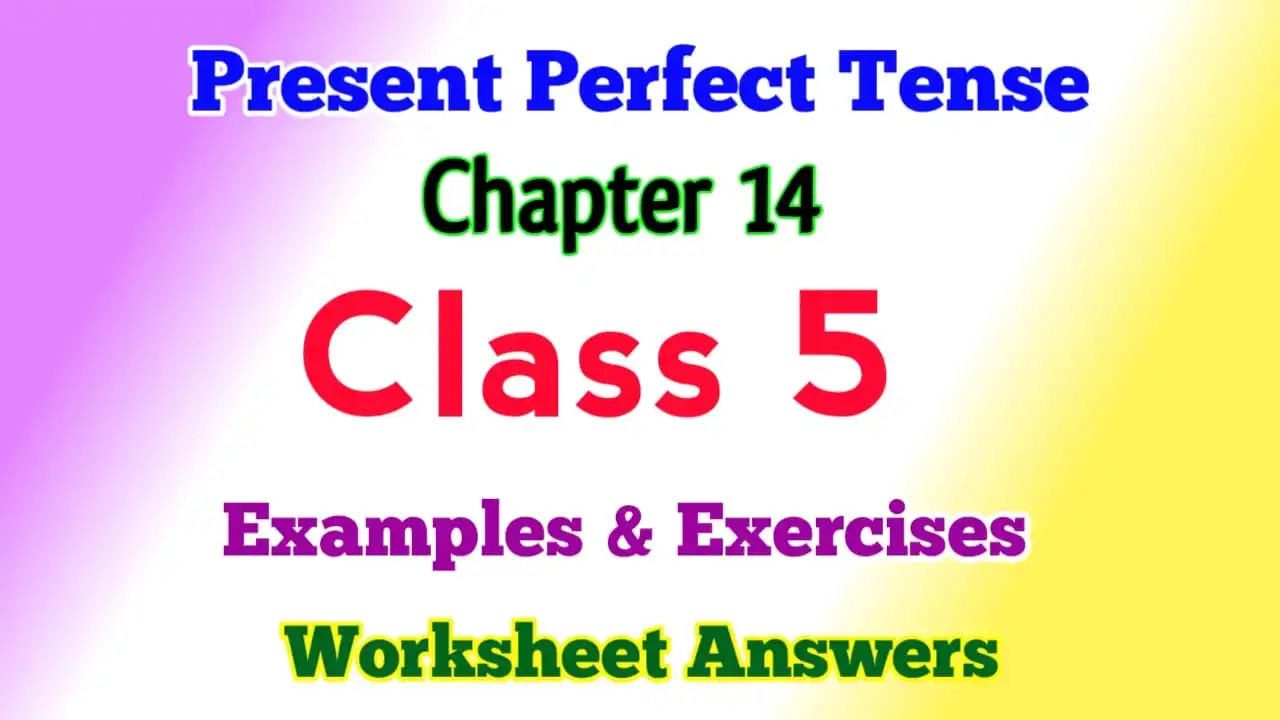Present Perfect Tense Class 5 English Grammar has been prepared for learning English Grammar of Class 5 under CBSE, ICSE, and Other State boards as Lesson No 14. Class 5 students in their English Grammar learning process will get help from the Present Perfect Tense Class 5 English Grammar to achieve better speaking and writing skills in English.
This Lesson 14, Present Perfect Tense Class 5 English Grammar contains – What Present Perfect Tense is? and Present Perfect Tense Formula, Uses, with a practice worksheet at the end for better knowledge for class 5.
English Grammar eBook Class 5
Example: Present Perfect Tense Class 5 English Grammar
- I have played computer games.
- He has been ill since Monday last.
- They have eaten their breakfast.
- Have you watched the film, ‘Tintin’?
- Shruti has gone to market.
All the above-highlighted words refer to an action that has recently been completed or an action completed in the past but whose effect can be felt at the time of speaking.
When the verb of the sentence refers to an action that has been just completed or the action started in the past, but the effect is yet to be completed, or where the time of action is not important, it is in the Present Perfect Tense.
Formula: Present Perfect Tense Class 5 English Grammar
Present Perfect Tense Structure with Positive, Negative, Interrogative, and Negative-interrogative sentences has been discussed in the following.
Present Perfect (Positive)
| Formula: Subject + has/have + Verb (past-participle) + Object. |
Chart – 1
| Person | Singular | Plural |
| 1st | I have played football. | We have played football. |
| 2nd | You have played football. | You have played football. |
| 3rd | He / She / has played football. | They have played football. |
Present Perfect (Negative)
| Formula: Subject + has/have + not + Verb (past-participle) + Object. |
Chart – 2
| Person | Singular | Plural |
| 1st | I have not played football. | We have not played football. |
| 2nd | You have not played football. | You have not played football. |
| 3rd | He / She / It has not played football. | They have not played football. |
Present Perfect (Interrogative)
| Formula: Have / Has + Subject + Verb (past-participle) + Object? |
Chart – 3
| Person | Singular | Plural |
| 1st | Have I played football? | Have we played football? |
| 2nd | Have you played football? | Have are played football? |
| 3rd | Has he/she/it played football? | Have they played football? |
Wh-Word Question
| Formula: Wh-Word + Have / Has + Subject + Verb (past-participle) + Object? |
Example:
- Where have you gone?
- Why has the baby cried?
- How has she drawn?
- What have they planned?
Questions for information are made with the ‘Wh-word’. who, which, what, why, whose, whom, how are called ‘Wh-word’.
Present Perfect (Negative-Interrogative)
| Formula: Have / Has + Subject + not + Verb (past-participle) + Object? |
Chart – 4
| Person | Singular | Plural |
| 1st | Have I not played football? | Have we not played football? |
| 2nd | Have you not played football? | Have you not played football? |
| 3rd | Has he/she/it not played football? | Have they not played football? |
In the Negative-Interrogative sentence ‘not’ is placed before the subject noun and after the subject pronoun.
Example:
- Has not Ravi played football? (Before subject noun)
- Has he not played football? (After subject pronoun)
Uses: Present Perfect Tense Class 5 English Grammar
Present Perfect Tense is used
1. to talk about an action that is just completed.
Example:
- The train has just arrived.
2. to talk about an action, state, or event that started in the past and continues in the present. ‘For’, or ‘since’ are normally used to talk about this.
Example:
- They have lived in Delhi since 2000. (Point of time)
- He has worked in this organization for ten years. (Period of time.)
Since refers to point of time; For refers to the period of time.
3. to talk about action when time is not important.
Example:
- I have been to London.
- She has read the textbook.
4. to talk about an incident or an action that was completed in the recent past, with words like ‘just’ / ‘yet’ to suggest that the action is being discussed at the time of speaking.
Example:
- The train from Surat has just arrived.
- The meeting has not yet begun.
5. To talk about the recent past, we add ‘just’ / ‘yet’.
Example:
- They have yet to make the decision.
Worksheet: Present Perfect Tense Class 5 English Grammar.
Worksheet – 1
A. Fill in the blanks with verbs in the present perfect tense.
1. ______you ______ (see) my mother?
2. I just ______ (arrive) here.
3. Nobody ______ (touch) the statue.
4. Ravi ______ (go) to the market
5. Sudha ______ (give) this to his brother.
6.Rubina ______ (sing) well.
7. My friend ______never ______ (see) the Taj Mahal.
8.Rina’s brother ______ (buy) a storybook for her.
9. Mr Bose ______ (catch) a fish.
Worksheet – 2
B. Fill in the gaps using the verbs in the list in present perfect tense:
1. He ______ his arm.
2.She ______up early.
3.The teacher ______the boy.
4.The moon ______in the sky
5.Robin ______cold.
6. The swimmer ______across the English Channel.
[List of verbs: swim, wake, catch, broke, beat, rise]
Worksheet – 3
C. Fill in the blanks with for or since.
1. They have not met _________ 1995
2. Ms Rao has been a teacher _________ 2002
3. Sudhir hasn’t eaten anything _________ eight hours
4. Partha has read eleven books_________ last weekend
5 We have had the same car _________ ten years.
6. I haven’t seen my Uncle Murali _________ 2009
7. He has worked in this bank _________ five years.
8. Latha has loved dancing _________ she was a child.
9. She has lived in England _________ twelve years.
10. She hasn’t been on a holiday _________ last year
11. I haven’t seen my red jacket _________ yesterday. I think I have lost it.
12. I have been studying non-stop _________ 9:15 am
13. We have been working here _________ nine o’clock.
14. My father has had a driving licence _________ he was eighteen
15. She hasn’t taken a day off _________ the past six months
Worksheet – 4
D. Change the sentences as instructed,
1. Has he just left? (Change to negative)
2. T have not made dinner yet, (Change to affirmative)
3. Have you sent the message to Ruhi? (Change to affirmative)
4. Have you been to China? (Change to negative)
5. They have lost their dog (Change to interrogative)
6. Have you bought some broad? (Change to negative)
7. I have seen The Jungle Book (Change to interrogative.)
8. I have eaten a cupcake (Change to interrogative)
9. Has your sister found a job yet? (Change to affirmative)
10. She has studied French (Change to interrogative)
11. It has rained a lot this year. (Change to negative,)
12. You haven’t finished your lunch yet, (Change to interrogative).
Worksheet – 5
E. Tick(✓) the correct words.
1. Lata (has/have) finished her homework.
2. I (has/have) drunk the milk.
3. Tanshi (has/have) cleaned her room.
4. Chirag and Sippy (has/have) bought the toys.
5. You (has/have) given me a lovely gift.
6. Sanya (has/have) brought a new bicycle.
Worksheet – 6
G. Write meaningful sentences in Present Perfect Tense with the following words given in the help box.
Help box: Just, come, tree, cut, examination, pass, reach, school, steal, fish
Worksheet -7
H. Suppose you have read some storybooks on your summer vacation. Write five sentences using the present perfect tense about the names of books you have read and write the names of the writers. One has been done for you.
Example: I have read the book, ‘Selfish Giant’, and Oscar Wild has written it.
1.
2.
3.
4.
5.
Class 5 English Grammar: All Topics & Chapters????:
Chapter 1. Parts of speech
Chapter 2. The sentence and Types
Chapter 3. Subject and Predicate
Chapter 4. Nouns and their Types
Chapter 5. Noun and Number
Chapter 6. Noun and Gender
Chapter 7. Articles
Chapter 8. Pronouns and their Classifications
Chapter 9. Verbs and Types of Verbs
Chapter 10. Regular Verbs Irregular Verbs List
Chapter 11. Subject and Verb Agreement
Chapter 12. Simple Present Tense
Chapter 13. Present Continuous Tense
Chapter 14. Present Perfect Tense
Chapter 15. Present Perfect Continuous Tense
Chapter 16. Simple Past Tense
Chapter 17. Past Continuous Tense
Chapter 18. Past Perfect Tense
Chapter 19. Past Perfect Continuous Tense
Chapter 20. Simple Future Tense
Chapter 21. Future Continuous Tense
Chapter 22. Future Perfect Tense
Chapter 23. Future Perfect Continuous Tense
Chapter 24. Tense Exercises
Chapter 25. Modal Verbs
Chapter 26. Adjectives and their Types
Chapter 27. Degree of Adjectives
Chapter 28. Adverbs and Comparison
Chapter 29. Prepositions and their Uses
Chapter 30. Conjunctions
Chapter 31. Direct and Indirect Speech
Chapter 32. Transformation of Sentences
Chapter 33. Punctuation







